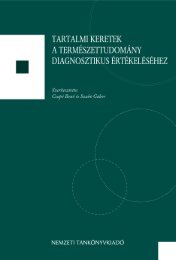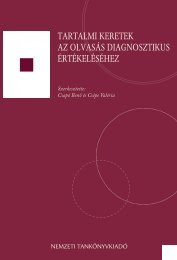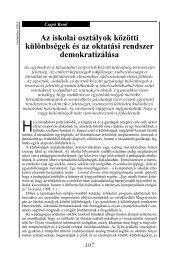értekezés - Neveléstudományi Intézet - Szegedi Tudományegyetem
értekezés - Neveléstudományi Intézet - Szegedi Tudományegyetem
értekezés - Neveléstudományi Intézet - Szegedi Tudományegyetem
You also want an ePaper? Increase the reach of your titles
YUMPU automatically turns print PDFs into web optimized ePapers that Google loves.
Korom Erzsébet (2002): Az iskolai tudás és a hétköznapi tapasztalat ellentmondásai: természettudományos<br />
tévképzetek. In: Csapó Benı (szerk.): Az iskolai tudás. Osiris Kiadó, Budapest.<br />
149–176.<br />
Korom Erzsébet (2008): A tartalmi tudás szervezıdése, az ismeretelsajátítás folyamata. In:<br />
Fazekas Károly (szerk.): Közoktatás, iskolai tudás és munkaerıpiaci siker, MTA Közgazdaságtudományi<br />
<strong>Intézet</strong>, Budapest, 131–144.<br />
Kovács Sándor (1960): Hogyan gyakoroljunk? Néhány tanács zenét tanulók számára. Zenemőkiadó,<br />
Budapest.<br />
Kraus, N., McGee, T., Carrell, T. D., King, C., Tremblay, K. és Nicol, T. (1995): Central<br />
auditory system plasticity associated with speech discrimination training. Journal of<br />
Cognitive Neuroscience, 7. 1. sz. 25–32.<br />
Kujala, T., Myllyvita, K., Tervaniemi, M., Alho, K., Kallio, J. és Naatanen, R. (2000): Basic<br />
auditory dysfunction in dyslexia as demonstrated by brain activity measurements.<br />
Psychology, 37. 262–266.<br />
Kupás Péter (1997): A matematikai élményekrıl és az esztétikumról. Szakdolgozat, Eötvös<br />
Lóránt <strong>Tudományegyetem</strong>, Budapest.<br />
Kwalwasser, I. (1953): Music Talent Test. Mills Inc., New York.<br />
Kwalwasser, I. és Dykema, P. (1930): Music Tests. Carl Fisher Inc., New York.<br />
Laczkó Mária (2008): Anyanyelvi szövegértés és grammatikai tudás. Új Pedagógiai Szemle,<br />
58. 1. sz. 12–23.<br />
Laczó Zoltán (1976): Kodály Zoltán koncepciójának hatása a legújabb zenepszichológiai kutatások<br />
tükrében. Elıadás a II. Nemzetközi Kodály Szimpóziumon. Ének-Zene Tanítása,<br />
1. sz. 10–22.<br />
Laczó, Z. (1985): The non-musical outcomes of music education: influence on intelligence?<br />
Bulletin of the Council for Research in Music Education, 85. 109–118.<br />
Laczó, Z. (1987): The first measurement of the effectiveness of the Kodály concept in Hungary<br />
using the Seashore test. Bulletin of the Council for Research in Music Education, 91.<br />
87–96.<br />
Lamb, S. J. és Gregory, A. H. (1993): The relationship between music and reading in<br />
beginning readers. Educational Psychology, 13. 1. sz. 19–27.<br />
Lantos Ferenc és Apagyi Mária (1992): A zenei és vizuális adottságok összefüggése és fejleszthetıségük.<br />
In: Czeizel Endre és Batta András (szerk.): A zenei tehetség gyökerei.<br />
Mahler Marcell Alapítvány – Arktisz Kiadó, Budapest. 249–272.<br />
Lave, J. (1988): Cognition in Practice. Cambridge University Press, Cambridge.<br />
Lawton, J. T. és Johnson, A. (1992): Effects of advance organizer instruction on preschool<br />
children’s learning of musical concepts. Bulletin of the Council of Research in Music<br />
Education, 111. 35–48.<br />
Lázár Katalin (1997): Népi játékok. Planétás Kiadó, Budapest.<br />
Leng, X. és Shaw, G. L. (1991): Toward a neural theory of higher brain function using music<br />
as window. Concepts of Neuroscience, 2. 229–258.<br />
Lerdahl, S. J. és Jackendoff, R.(1983): A Generative Theory of Tonal Music. MIT Press, London.<br />
Lietz, P. (2006): A meta-analisis of gender differences in reading achievement at the<br />
secondary school level. Studies in Educational Evaluation, 32. 317–344.<br />
L. Nagy Katalin (1996): Zenei nevelés – 2000. Iskolakultúra, 6. 12. sz. 37–49.<br />
290



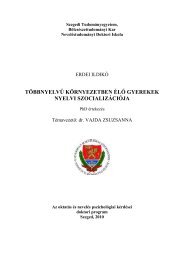
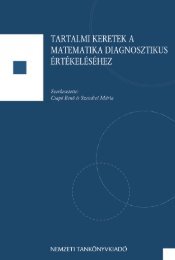
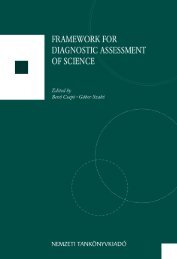
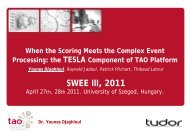
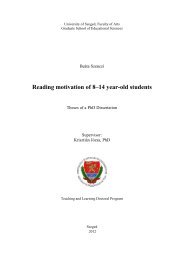

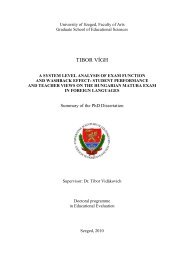
![Download [PDF] - Diagnosztikus Mérések Fejlesztése](https://img.yumpu.com/38928685/1/177x260/download-pdf-diagnosztikus-macracsek-fejlesztacse.jpg?quality=85)
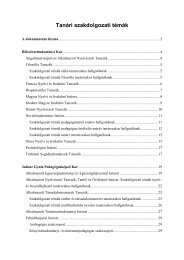
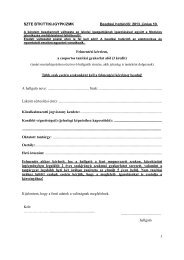
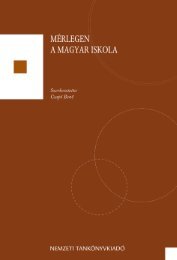
![Download [PDF] - Diagnosztikus Mérések Fejlesztése](https://img.yumpu.com/38928622/1/180x260/download-pdf-diagnosztikus-macracsek-fejlesztacse.jpg?quality=85)
